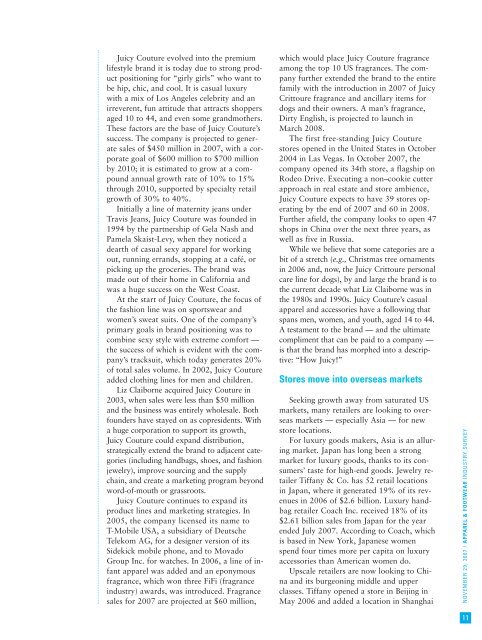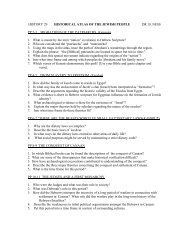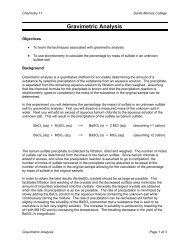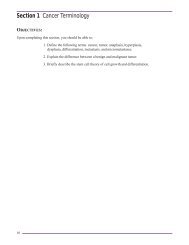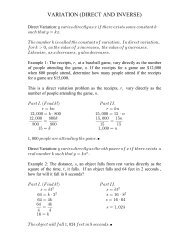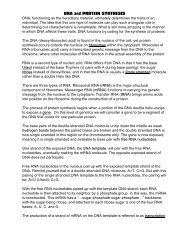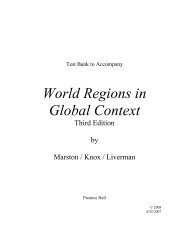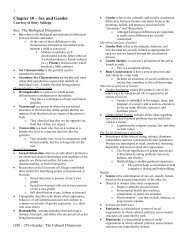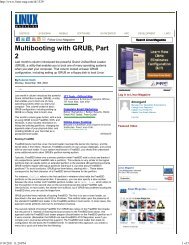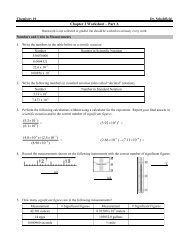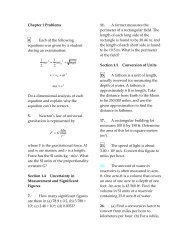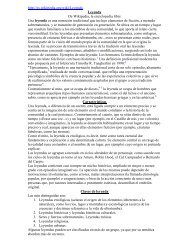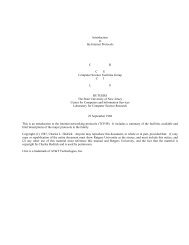Create successful ePaper yourself
Turn your PDF publications into a flip-book with our unique Google optimized e-Paper software.
Juicy Couture evolved into the premium<br />
lifestyle brand it is today due to strong product<br />
positioning for “girly girls” who want to<br />
be hip, chic, and cool. It is casual luxury<br />
with a mix of Los Angeles celebrity and an<br />
irreverent, fun attitude that attracts shoppers<br />
aged 10 to 44, and even some grandmothers.<br />
These factors are the base of Juicy Couture’s<br />
success. The company is projected to generate<br />
sales of $450 million in 2007, with a corporate<br />
goal of $600 million to $700 million<br />
by 2010; it is estimated to grow at a compound<br />
annual growth rate of 10% to 15%<br />
through 2010, supported by specialty retail<br />
growth of 30% to 40%.<br />
Initially a line of maternity jeans under<br />
Travis Jeans, Juicy Couture was founded in<br />
1994 by the partnership of Gela Nash and<br />
Pamela Skaist-Levy, when they noticed a<br />
dearth of casual sexy apparel for working<br />
out, running errands, stopping at a café, or<br />
picking up the groceries. The brand was<br />
made out of their home in California and<br />
was a huge success on the West Coast.<br />
At the start of Juicy Couture, the focus of<br />
the fashion line was on sportswear and<br />
women’s sweat suits. One of the company’s<br />
primary goals in brand positioning was to<br />
combine sexy style with extreme comfort —<br />
the success of which is evident with the company’s<br />
tracksuit, which today generates 20%<br />
of total sales volume. In 2002, Juicy Couture<br />
added clothing lines for men and children.<br />
Liz Claiborne acquired Juicy Couture in<br />
2003, when sales were less than $50 million<br />
and the business was entirely wholesale. Both<br />
founders have stayed on as copresidents. With<br />
a huge corporation to support its growth,<br />
Juicy Couture could expand distribution,<br />
strategically extend the brand to adjacent categories<br />
(including handbags, shoes, and fashion<br />
jewelry), improve sourcing and the supply<br />
chain, and create a marketing program beyond<br />
word-of-mouth or grassroots.<br />
Juicy Couture continues to expand its<br />
product lines and marketing strategies. In<br />
2005, the company licensed its name to<br />
T-Mobile USA, a subsidiary of Deutsche<br />
Telekom AG, for a designer version of its<br />
Sidekick mobile phone, and to Movado<br />
Group Inc. for watches. In 2006, a line of infant<br />
apparel was added and an eponymous<br />
fragrance, which won three FiFi (fragrance<br />
industry) awards, was introduced. Fragrance<br />
sales for 2007 are projected at $60 million,<br />
which would place Juicy Couture fragrance<br />
among the top 10 US fragrances. The company<br />
further extended the brand to the entire<br />
family with the introduction in 2007 of Juicy<br />
Crittoure fragrance and ancillary items for<br />
dogs and their owners. A man’s fragrance,<br />
Dirty English, is projected to launch in<br />
March 2008.<br />
The first free-standing Juicy Couture<br />
stores opened in the United States in October<br />
2004 in Las Vegas. In October 2007, the<br />
company opened its 34th store, a flagship on<br />
Rodeo Drive. Executing a non–cookie cutter<br />
approach in real estate and store ambience,<br />
Juicy Couture expects to have 39 stores operating<br />
by the end of 2007 and 60 in 2008.<br />
Further afield, the company looks to open 47<br />
shops in China over the next three years, as<br />
well as five in Russia.<br />
While we believe that some categories are a<br />
bit of a stretch (e.g., Christmas tree ornaments<br />
in 2006 and, now, the Juicy Crittoure personal<br />
care line for dogs), by and large the brand is to<br />
the current decade what Liz Claiborne was in<br />
the 1980s and 1990s. Juicy Couture’s casual<br />
apparel and accessories have a following that<br />
spans men, women, and youth, aged 14 to 44.<br />
A testament to the brand — and the ultimate<br />
compliment that can be paid to a company —<br />
is that the brand has morphed into a descriptive:<br />
“How Juicy!”<br />
Stores move into overseas markets<br />
Seeking growth away from saturated US<br />
markets, many retailers are looking to overseas<br />
markets — especially Asia — for new<br />
store locations.<br />
For luxury goods makers, Asia is an alluring<br />
market. Japan has long been a strong<br />
market for luxury goods, thanks to its consumers’<br />
taste for high-end goods. Jewelry retailer<br />
Tiffany & Co. has 52 retail locations<br />
in Japan, where it generated 19% of its revenues<br />
in 2006 of $2.6 billion. Luxury handbag<br />
retailer Coach Inc. received 18% of its<br />
$2.61 billion sales from Japan for the year<br />
ended July 2007. According to Coach, which<br />
is based in New York, Japanese women<br />
spend four times more per capita on luxury<br />
accessories than American women do.<br />
Upscale retailers are now looking to China<br />
and its burgeoning middle and upper<br />
classes. Tiffany opened a store in Beijing in<br />
May 2006 and added a location in Shanghai<br />
NOVEMBER 29, 2007 / APPAREL & FOOTWEAR INDUSTRY SURVEY<br />
11


